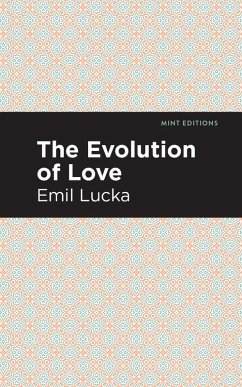"Love is a theme which at all times and in all countries has been of primary interest to men and women, and therefore this book, which throws an illuminating ray of light in many a dark place still wrapped in mystery and silence, not only impresses the psychologist, but also fascinates the general reader with its wealth of interesting detail and charm of expression."-Ellie Schleussner
In The Evolution of Love (1922) the Austrian Poet-Philosopher Emil Lucka reveals his conception of the development of love and sex. In his revolutionary presentation of ideas, the author blends history, psychology, and philosophy to speculate that love is not a fundamental predisposition, but evolved through historical changes.
There are three distinct stages of the development of love that Lucka explores in this important work; Metaphysical Eroticism, the first, is the exploration of emotional climaxes and the sexual instinct. Moving from prehistoric man through the ideals of Greek love, and to the spread of Christianity, he lays his foundation through the lens of history. The second stage is Love, which he again demonstrates its development through history, specifically the birth of European civilization. The third stage is the unity of sexual impulse and love, the evolution of the spiritual love of man for woman based on personality. Finally, Lucka delves into erotic aberrations, exploring perversities of sex and love through the progress of history. In Lucka's conclusion, he looks at the realm of the spirit in the context of Ernst Heackel's biogenetic law.
With an eye-catching new cover, and professionally typeset manuscript, this edition of The Evolution of Love is both modern and readable.
Since our inception in 2020, Mint Editions has kept sustainability and innovation at the forefront of our mission. Each and every Mint Edition title gets a fresh, professionally typeset manuscript and a dazzling new cover, all while maintaining the integrity of the original book.
With thousands of titles in our collection, we aim to spotlight diverse public domain works to help them find modern audiences. Mint Editions celebrates a breadth of literary works, curated from both canonical and overlooked classics from writers around the globe.
In The Evolution of Love (1922) the Austrian Poet-Philosopher Emil Lucka reveals his conception of the development of love and sex. In his revolutionary presentation of ideas, the author blends history, psychology, and philosophy to speculate that love is not a fundamental predisposition, but evolved through historical changes.
There are three distinct stages of the development of love that Lucka explores in this important work; Metaphysical Eroticism, the first, is the exploration of emotional climaxes and the sexual instinct. Moving from prehistoric man through the ideals of Greek love, and to the spread of Christianity, he lays his foundation through the lens of history. The second stage is Love, which he again demonstrates its development through history, specifically the birth of European civilization. The third stage is the unity of sexual impulse and love, the evolution of the spiritual love of man for woman based on personality. Finally, Lucka delves into erotic aberrations, exploring perversities of sex and love through the progress of history. In Lucka's conclusion, he looks at the realm of the spirit in the context of Ernst Heackel's biogenetic law.
With an eye-catching new cover, and professionally typeset manuscript, this edition of The Evolution of Love is both modern and readable.
Since our inception in 2020, Mint Editions has kept sustainability and innovation at the forefront of our mission. Each and every Mint Edition title gets a fresh, professionally typeset manuscript and a dazzling new cover, all while maintaining the integrity of the original book.
With thousands of titles in our collection, we aim to spotlight diverse public domain works to help them find modern audiences. Mint Editions celebrates a breadth of literary works, curated from both canonical and overlooked classics from writers around the globe.
Dieser Download kann aus rechtlichen Gründen nur mit Rechnungsadresse in A, D ausgeliefert werden.









